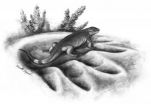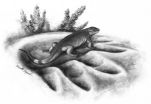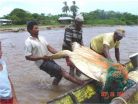(Press-News.org) A new fossil may provide evidence that large caseid herbivores, the largest known terrestrial vertebrates of their time, evolved from small non-herbivorous members of that group, according to a study published April 16, 2014 in the open-access journal PLOS ONE by Robert Reisz from University of Toronto and Jörg Fröbisch of the Museum für Naturkunde.
The origin and early evolution of vertebrates living on land led to major changes in the structure of terrestrial ecosystems. The first appearance of herbivores played a pivotal role in this transformation, and a newly discovered species, Eocasea martini, from Kansas, USA may provide information about early caseids. In this study, researchers describe and discuss the evolutionary and paleoecological implications of this new taxon.
The oldest caseid recorded, E. martini was from the Late Carboniferous, about 305-300 million years ago. The characteristics of the fossil indicate that it was likely a small carnivore. Caseids are characteristically herbivores, so this fossil may provide evidence that large caseid herbivores evolved from small carnivorous members of that group. This pattern is mirrored by three other groups, documenting multiple, independent, but temporally staggered, origins of herbivory and a possible increase in body size among early terrestrial tetrapods, leading to patterns consistent with modern terrestrial ecosystems.
"The evolution of herbivory was revolutionary to life on land because it meant terrestrial vertebrates could directly access the vast resources provided by terrestrial plants," says paleontologist Robert Reisz, Department of Biology. "These herbivores in turn became a major food resource for large land predators."
INFORMATION:
Citation: Reisz RR, Fröbisch J (2014) The Oldest Caseid Synapsid from the Late Pennsylvanian of Kansas, and the Evolution of Herbivory in Terrestrial Vertebrates. PLoS ONE 9(4): e94518. doi:10.1371/journal.pone.0094518
Financial Disclosure: Funding provided by a Discovery Grant from Natural Sciences and Engineering Research Council (Canada) and an Alexander von Humboldt Visiting Fellowship (Germany) to RRR Sofja Kovalevskaja Award of the Alexander von Humboldt Foundation donated by the Federal Ministry of Education and Research (Germany) to JF. The funders had no role in study design, data collection and analysis, decision to publish, or preparation of the manuscript.
Competing Interest Statement: The authors have declared that no competing interests exist.
PLEASE LINK TO THE SCIENTIFIC ARTICLE IN ONLINE VERSIONS OF YOUR REPORT (URL goes live after the embargo ends): http://dx.plos.org/10.1371/journal.pone.0094518
New species discovery sheds light on herbivore evolution
Fossil extends knowledge on caseid eating habits and time period
2014-04-17
ELSE PRESS RELEASES FROM THIS DATE:
Research may help doctors predict who gets long-term complications from Lyme disease
2014-04-17
A team of scientists led by Johns Hopkins and Stanford University researchers has laid the groundwork for understanding how variations in immune responses to Lyme disease can contribute to the many different outcomes of this bacterial infection seen in individual patients. A report on the work appears online April 16 in PLOS One.
"Physicians have recognized for many years that Lyme disease is not a uniform disease process and can vary in outcomes," says Mark Soloski, Ph.D., a professor of medicine at the Johns Hopkins University School of Medicine and senior author of ...
Off-season doesn't allow brain to recover from football hits, study says
2014-04-17
Six months off may not be long enough for the brains of football players to completely heal after a single season, putting them at even greater risk of head injury the next season.
"I don't want to be an alarmist, but this is something to be concerned about," said Jeffrey J. Bazarian, M.D., associate professor of Emergency Medicine at the University of Rochester School of Medicine and Dentistry and lead author of the study, published in PLOS ONE.
"At this point we don't know the implications, but there is a valid concern that six months of no-contact rest may not be enough ...
Earliest ancestor of land herbivores discovered
2014-04-17
New research from the University of Toronto Mississauga demonstrates how carnivores transitioned into herbivores for the first time on land.
"The evolution of herbivory was revolutionary to life on land because it meant terrestrial vertebrates could directly access the vast resources provided by terrestrial plants," says paleontologist Robert Reisz, a professor in the Department of Biology. "These herbivores in turn became a major food resource for large land predators."
Previously unknown, the 300-million-year old fossilized juvenile skeleton of Eocasea martini is ...
Banning chocolate milk backfires
2014-04-17
ITHACA, N.Y. – To some, banning chocolate milk from elementary schools seemed like a good idea, but new Cornell University research shows that removing chocolate milk from school menus has negative consequences.
"When schools ban chocolate milk, we found it usually backfires. On average, milk sales drop by 10 percent, 29 percent of white milk gets thrown out, and participation in the school lunch program may also decrease," reports Andrew Hanks, lead author and research associate Cornell's Dyson School of Applied Economics and Management. "This is probably not what parents ...
Researchers see hospitalization records as additional tool
2014-04-17
MEDFORD/SOMERVILLE, Mass. – Comparing hospitalization records with data reported to local boards of health presents a more accurate way to monitor how well communities track disease outbreaks, according to a paper published April 16 in the journal PLOS ONE by a research team led by Elena Naumova, Ph.D., professor of civil and environmental engineering and associate dean at Tufts University School of Engineering.
In a paper titled "Hospitalization Records as a Tool for Evaluating Performance of Food and Water-Borne Disease Surveillance Systems: A Massachusetts Case Study," ...
The surprising consequences of banning chocolate milk
2014-04-17
VIDEO:
Director of the Cornell Food and Brand Lab, Brian Wansink recommends, "There are other ways to encourage kids to select white milk without banning the chocolate. Make white milk appear...
Click here for more information.
For many children eating school lunch, chocolate milk is a favorite choice. What would happen if chocolate milk were banned from school cafeterias? "Students take 10% less milk, waste 29% more and may even stop eating school meals," says Andrew Hanks, ...
Family ties in the language jungle
2014-04-17
This news release is available in German. The only linguistic data available for Carabayo, a language spoken by an indigenous group that lives in voluntary isolation, is a set of about 50 words. This list was compiled in 1969 during a brief encounter with one Carabayo family. Frank Seifart of the Max Planck Institute for Evolutionary Anthropology in Leipzig, Germany, and Juan Alvaro Echeverri of the Universidad Nacional de Colombia in Leticia, Colombia, have now analysed this historical data set and compared it with various languages (once) spoken in the region. The ...
High disease load reduces mortality of children
2014-04-17
This news release is available in German. Children who have been conceived during a severe epidemic are more resistant against other pathogens later in life. For the first time this has been proved by researchers at the Max Planck Institute for Demographic Research (MPIDR) in Rostock, Germany, for the 18th century epidemics of measles and smallpox in the Canadian province of Québec. Children who were conceived during the wave of measles in 1714 and 1715 died significantly less often from smallpox 15 years later than children who had been conceived before the measles ...
Declining catch rates in Caribbean green turtle fishery may be result of overfishing
2014-04-17
A 20-year assessment of Nicaragua's legal, artisanal green sea turtle fishery has uncovered a stark reality: greatly reduced overall catch rates of turtles in what may have become an unsustainable take, according to conservation scientists from the Wildlife Conservation Society and University of Florida.
During the research period, conservation scientists estimated that more than 170,000 green turtles were killed between 1991 and 2011, with catch rates peaking in 1997 and 2002 and declining steeply after 2008, likely resulting from over-fishing. The trend in catch rates, ...
In old age, lack of emotion and interest may signal your brain is shrinking
2014-04-16
MINNEAPOLIS – Older people who have apathy but not depression may have smaller brain volumes than those without apathy, according to a new study published in the April 16, 2014, online issue of Neurology®, the medical journal of the American Academy of Neurology. Apathy is a lack of interest or emotion.
"Just as signs of memory loss may signal brain changes related to brain disease, apathy may indicate underlying changes," said Lenore J. Launer, PhD, with the National Institute on Aging at the National Institutes of Health (NIH) in Bethesda, MD, and a member of the American ...
LAST 30 PRESS RELEASES:
Scientists show how to predict world’s deadly scorpion hotspots
ASU researchers to lead AAAS panel on water insecurity in the United States
ASU professor Anne Stone to present at AAAS Conference in Phoenix on ancient origins of modern disease
Proposals for exploring viruses and skin as the next experimental quantum frontiers share US$30,000 science award
ASU researchers showcase scalable tech solutions for older adults living alone with cognitive decline at AAAS 2026
Scientists identify smooth regional trends in fruit fly survival strategies
Antipathy toward snakes? Your parents likely talked you into that at an early age
Sylvester Cancer Tip Sheet for Feb. 2026
Online exposure to medical misinformation concentrated among older adults
Telehealth improves access to genetic services for adult survivors of childhood cancers
Outdated mortality benchmarks risk missing early signs of famine and delay recognizing mass starvation
Newly discovered bacterium converts carbon dioxide into chemicals using electricity
Flipping and reversing mini-proteins could improve disease treatment
Scientists reveal major hidden source of atmospheric nitrogen pollution in fragile lake basin
Biochar emerges as a powerful tool for soil carbon neutrality and climate mitigation
Tiny cell messengers show big promise for safer protein and gene delivery
AMS releases statement regarding the decision to rescind EPA’s 2009 Endangerment Finding
Parents’ alcohol and drug use influences their children’s consumption, research shows
Modular assembly of chiral nitrogen-bridged rings achieved by palladium-catalyzed diastereoselective and enantioselective cascade cyclization reactions
Promoting civic engagement
AMS Science Preview: Hurricane slowdown, school snow days
Deforestation in the Amazon raises the surface temperature by 3 °C during the dry season
Model more accurately maps the impact of frost on corn crops
How did humans develop sharp vision? Lab-grown retinas show likely answer
Sour grapes? Taste, experience of sour foods depends on individual consumer
At AAAS, professor Krystal Tsosie argues the future of science must be Indigenous-led
From the lab to the living room: Decoding Parkinson’s patients movements in the real world
Research advances in porous materials, as highlighted in the 2025 Nobel Prize in Chemistry
Sally C. Morton, executive vice president of ASU Knowledge Enterprise, presents a bold and practical framework for moving research from discovery to real-world impact
Biochemical parameters in patients with diabetic nephropathy versus individuals with diabetes alone, non-diabetic nephropathy, and healthy controls
[Press-News.org] New species discovery sheds light on herbivore evolutionFossil extends knowledge on caseid eating habits and time period




